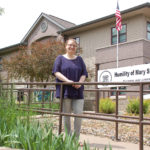A powerful storm struck Coralville around 8 p.m. July 28, tossing aside and soaking the small, dome-shaped tents of many participants of RAGBRAI, including some of those camping outside St. Thomas More Catholic Church.
Shannon Duffy, the parish’s director of religious education, was discussing the weather situation with a group from Texas when he noticed police officers had arrived. “Together we went around and told people to come inside, especially those staying in tents. I would say around 150-200 people came inside during the poor weather.” Many on RAGBRAI (Register’s Annual Bicycle Ride Across Iowa) were familiar with Midwestern weather but some were not.
He followed up with all the RAGBRAI groups “letting them know that if they were worried about the weather or lost their tents they were free to stay inside. When entrusted to our care (people and pets), we wanted to make sure they felt safe and welcome in our church and in our city of Coralville.”
Duffy stayed at the church until midnight, “to make sure everyone had a place to sleep and to see if they needed anything else before I left and to give them the all-clear when the bad weather passed.” That’s what hospitality looks like in practice — sacrificing our convenience for the sake of others.
Building relationships is another essential element of hospitality, which the pastor, Father Chuck Adam, and parishioners had been doing all day — even while preparing for a wedding rehearsal that evening and the wedding the next day. They made time to visit with people staying inside and outside Camp St. Thomas More, one of the overnight host sites for RAGBRAI in Coralville.
“It felt almost like we were providing shelter for family members,” Duffy said. “They were all very grateful for our hospitality and accommodations. So many of them thanked us for providing them with a meal, a place to stay, a storm shelter, etc. It all went fairly smoothly considering the circumstances and how quickly the storm approached the area. Many of them verbally thanked us for making sure they were safe and cared for.”
Duffy admits to sometimes being a “bit of an introvert, but I felt very motivated to simply chat with people to find out where they were from, let them know about our meal and bake sale and the Mass with Archbishop-elect Thomas Zinkula. We offered people a meal, a place to sleep, shelter from the storm and hospitality.” St. Thomas More shared the Good News of the Gospel by simply hearing people’s stories and caring for their needs. That’s what hospitality looks like in practice.
RAGBRAI draws bicyclists and their support crews from throughout the United States and other countries for one week every summer (for the past 50 years). Each night, small communities form, connecting over bicycling and hospitality. That means sharing a meal with strangers, fixing someone else’s flat tire, providing first aid to an injured rider, offering encouragement to a rider struggling against the elements or fatigue or providing shelter from a storm.
At St. Patrick Catholic Church in Tama, one of the overnight host sites July 27, RAGBRAI participant Michael Mulligan of St. Mary Parish in Williamsburg struck up conversation with a rider fretting over his lost bicycle shoes. Although Michael looked forward to settling down in his small tent, he offered to drive the rider to the place where his shoes had been left inadvertently. That’s what hospitality looks like, too.
In a Catholic News Service story in this week’s issue, Pope Francis makes an observation about Mary from the verse “Mary rose and went in haste” in Luke’s Gospel, which is the theme of World Youth Day. “When Mary knows she will be the mother of God she doesn’t stay there to take a selfie or show off, the first thing she does is set out on a journey in haste to serve and help,” the Holy Father said. “You must learn from her to set out on the journey to help others.” That’s what hospitality looks like.
In his short presentation during the diocesan Synodal Summit June 17, Deacon Frank Agnoli described “the perfect (mythical) parish” of St. Meinrad. Imaging what makes a perfect parish leads to questions that all of us as parishioners can ask ourselves: “How do we see each other? How do we act?” Let’s apply the examples of RAGBRAI hospitality year-round in our parishes and in our daily interactions. Let’s provide shelter from the storms of other people’s lives.
Barb Arland-Fye, Editor
arland-fye@davenportdiocese.org












